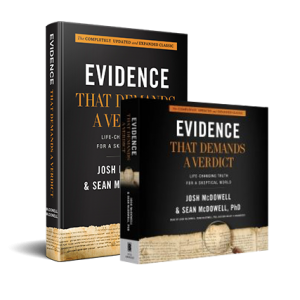
Is it possible to know if God really exists, or do we each get to decide His existence for ourselves?
When it comes to asking if God really exists, some contemporary philosophers deny that we can know for sure. No one, they say, can really know, because His existence isn’t provable. God, they say, is the stuff of legends, tall tales, and delusional thinking — because, to them, He hasn’t offered the right proof that He’s real.
But here’s the thing: there is a truth and reality about God’s existence, even if we choose to disregard it.
As the great philosopher Mortimer Adler once noted, “there is a reality that is independent of the human mind, to which the mind can either conform or fail to conform. In other words, what we think does not create or in any way affect what we are thinking about. It is what it is, whether we think about it or not and regardless of what we think about it.”
Beyond a Reasonable Doubt
Can we say with 100 percent certainty that God really exists? No. But the key is not a perfect or absolute certainty, as skeptics assert, but a standard of proof that answers the question beyond a reasonable doubt. For skeptics to claim, “God can’t be proved,” doesn’t then make their assertion that “God isn’t real!” true.
“When a judge charges a jury,” says Josh McDowell, “he or she tells them to decide based on probability, not certainty; based on the evidence presented, not the certainty of having viewed the crime. If jury decisions were delayed until 100 percent certainty existed, no verdict would ever be rendered. Skeptics demand absolute certainty in religious matters, yet they don’t apply the standard of absolute certainty to anything else of major importance.”
Atheists, he adds, can’t even be 100 percent certain of their own belief that God doesn’t exist. And to deny the existence of God necessitates admitting the possibility that He does exist. The real struggle for most skeptics isn’t that they can’t believe, it’s that they’ve decided to refuse to believe. And many skeptics, if you ask them what definitive proof they need to believe, can’t tell you. They would rather cling to their assertion that God is a “delusional crutch” for otherwise possibly intelligent people. That dig is so silly it doesn’t even hurt. 😉
Does their unbelief make God nonexistent? Nope. Belief does not create truth; truth is independent of belief.
In pondering the concept of reality, business guru Seth Godin recently wrote this amazing statement:
“It’s ever easier to weave our own reality, to find a bubble and to reinforce what we believe with what we hear. We can invent our own rules, create our own theories, fabricate our own ‘facts.’ It turns out, though, that when your reality is based on actual reality, it’s a lot more stable and resilient, because you don’t have to be so vigilant about what you’re going to filter out.”
Christianity Is, In Fact, Provable
We agree with skeptics on one point: people shouldn’t believe in God because simply they were taught to do so. God calls us to a deeper knowledge of Him than blind faith. (Nor should we accept all teaching as truthful Christian doctrine, without researching that its biblically sound.) Rather, God invites us into a relationship with Himself. He desires that we learn about Him, and learn to trust and love Him. So He continues to show us who He is.
Christianity is based on fact, not just faith.
Despite what critics say, Christianity has proven to be grounded in strong evidence. It has a high degree of probability for its claims of truth. We see evidence of God’s existence in our amazingly intricate world. DNA itself shouts of a deliberate designer who not only created the world but keeps it going! Marilyn Adamson writes in her article on EveryStudent.com:
“How is it that we can identify laws of nature that never change? Why is the universe so orderly, so reliable? The greatest scientists have been struck by how strange this is. There is no logical necessity for a universe that obeys rules, let alone one that abides by the rules of mathematics. This astonishment springs from the recognition that the universe doesn’t have to behave this way. It is easy to imagine a universe in which conditions change unpredictably from instant to instant, or even a universe in which things pop in and out of existence. Richard Feynman, a Nobel Prize winner for quantum electrodynamics, said, ‘Why nature is mathematical is a mystery…The fact that there are rules at all is a kind of miracle.'”
In His Word, God tells us about His nature and His plan for mankind. God has also proven His existence through Jesus. No one in human history has made the claims Jesus made and been able to give rock-solid proof to back them up. Jesus had power over sickness, nature, sin, and even death. And Jesus repeatedly redirected human focus back to God.
In another article on EveryStudent.com, the writer uses the analogy of a college student charged with a crime to showcase the critical role Jesus willingly played for us:
“The judge sentences her to 30 days in jail or a $1,000 fine. The student can afford neither the time nor the money. The judge, knowing this, takes off his robes, walks to the front of the bench, and with his own checkbook pays the fine. Why? Because, as a just judge, he cannot overlook the offense. But, because he is the student’s father, he chooses to pay the penalty on her behalf. This is exactly what Jesus did for each of us on the cross. He made the great sacrifice of being beaten, humiliated, whipped and crucified on our behalf. He now asks us to respond to his sacrifice by inviting him into our lives.”
Fighting God’s Knock?
We have often wondered why some atheists are so determined to belittle and smear Christianity, to debunk that God really exists. This quote by Adamson, herself a former atheist, opened our eyes to one possibility:
“I didn’t realize that the reason the topic of God weighed so heavily on my mind, was because God was pressing the issue. I have come to find out that God wants to be known. He created us with the intention that we would know him. He has surrounded us with evidence of himself and he keeps the question of his existence squarely before us. It was as if I couldn’t escape thinking about the possibility of God. In fact, the day I chose to acknowledge God’s existence, my prayer began with, ‘Ok, you win…’ It might be that the underlying reason atheists are bothered by people believing in God is because God is actively pursuing them.”
Adamson adds that author C.S. Lewis, who also lost his battle to ignore God’s knocking at his soul, said he remembered, “…night after night, feeling whenever my mind lifted even for a second from my work, the steady, unrelenting approach of Him whom I so earnestly desired not to meet. I gave in, and admitted that God was God, and knelt and prayed: perhaps, that night, the most dejected and reluctant convert in all of England.”
Lewis had enormous influence on the world. Imagine the loss to the world if Lewis had not penned the Narnia novels as well as his numerous other books that are now considered Christian classics.
Choice, Not Truth, is Entirely Up to Us
Does God really exist? As Dr. William Lane Craig notes, this could be the most important question a person can consider. Our individual choice, to believe in or reject the existence of God, has enormous implications on how we view of life, morality, and humanity. Yet some of us are waiting for that one piece of definitive proof before we’ll believe — all the while ignoring God’s activity all around us.
The thing is, God is attempting to get our attention all the time.
With every sunrise and sunset. With every bird’s chirp. With every baby’s laugh. With every beat of our heart. Satan has done a great job of ensuring we have plenty of noise around us 24/7 — TV, internet, texting, Facebook, etc. — not to mention the daily demands of work and family, which helps to dull our ears to God’s voice.
So, to hear God, we might have to get really quiet.
Granted, leaning into the silence feels really weird — and unproductive — to people grown long accustomed to constant bombardment of interruption and noise. We’re a society accustomed to proving our worth by our level of busyness. And we instinctively shrink from the heaviness of silence, because it is in its pin-drop quietness that we just might realize how hard we have been working to deny our need for God.
God really exists. We all know this in the deepest recesses of our hearts. But we must choose to open our minds to His showing us that He is present and actively working in the world to accomplish His purposes. That He cares, even when life really, really hurts.
Bottom line: We can choose to fight Him or follow Him. God, in His graciousness, leaves the choice entirely up to us.

This blog post highlights Josh and Sean McDowell’s recently revised apologetics classic, Evidence That Demands a Verdict. We are certain this fully updated and expanded resource will be an effective evangelism tool for you, and strengthen your faith by answering the toughest questions tossed to you by skeptics. Know what you know, because it’s true. But share this truth with LOVE!
If you’d like to start from the first blog post in this series, click here: Apologetics: Apologizing for Believing in God?.



